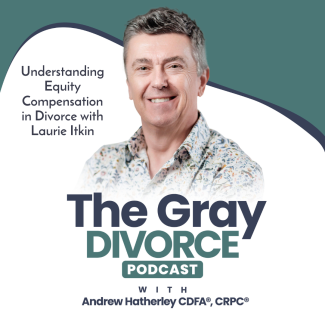
The Gray Divorce Podcast: Episode 80 Understanding Equity Compensation in Divorce with Laurie Itkin
In this episode, Andrew speaks with Laurie Itkin, a nationally recognized CDFA and former board member of the Association of Divorce Financial Planners. Laurie has advised on hundreds of California divorce cases—often involving complex portfolios of stock options and RSUs—and specializes in helping attorneys and clients fairly divide these assets.
Together, Andrew and Laurie unpack the financial, legal, and emotional layers of dividing equity compensation during divorce.
Equity Compensation 101
Laurie begins by explaining what equity compensation actually is—a form of payment where employees receive company stock or options in addition to salary and bonuses.
These assets can include:
- Restricted Stock Units (RSUs)
- Incentive Stock Options (ISOs)
- Non-Qualified Stock Options (NQSOs)
- Performance Stock Units (PSUs)
They discuss why these awards are often misunderstood by both financial advisors and family law attorneys—and why they can represent a huge hidden portion of a family’s wealth.
Key Terms Explained
Laurie walks listeners through the essential terms every divorcing couple should understand:
- Granting – When the company promises a specific number of shares.
- Vesting – When you actually earn the right to receive those shares (usually over several years).
- Exercise – When you purchase or realize the value of stock options at the given “strike price.”
- Selling – When you cash out and potentially trigger taxable gains.
She emphasizes: vesting is a taxable event, and understanding when taxes are withheld—and when they’re not—is critical during divorce negotiations.
Dividing Stock in Divorce: What You Need to Know
- RSUs and Custodians: Once vested, shares are typically held by a custodian and can be transferred to a spouse without a QDRO (Qualified Domestic Relations Order)—a common misconception among attorneys.
- Timing Matters: When shares are granted before marriage but vest afterward (or vice versa), determining what’s marital vs. separate property can get complicated.
- Different States, Different Rules: Laurie compares how California, Texas, and other states treat vested vs. unvested stock, emphasizing the importance of working with a CDFA who knows your state’s laws.
Taxes, Tracing, and Common Pitfalls
Laurie and Andrew explore the tax traps that can lead to costly mistakes:
- Companies may withhold too little tax at vesting, leaving a surprise bill later.
- Selling stock too soon after separation can trigger tracing nightmares, especially in community property states like California.
- “Double-dipping” happens when the same stock income is counted both as property and as income for support—a major error in divorce settlements.
Her advice? Work with professionals who understand these nuances—and never assume your attorney or CPA does.
The ‘If and When’ Rule
Laurie explains the “if and when” language often used in divorce settlements:
If the equity compensation vests, and when it pays out, the employee spouse must share it according to the agreed formula.
While fair in theory, this creates uncertainty for the non-employee spouse, who can’t predict future income or plan budgets around unpredictable stock awards.
Pro Tips from Laurie
- Get professional help early—don’t wait until after separation.
- Avoid selling RSUs post-separation if you live in a community property state.
- Educate yourself—understand at least the basics of how your stock plan works.
- Stay organized—bring all statements, grant documents, and paystubs to your financial team.
- Remember: the more prepared you are, the less you’ll pay in legal and financial fees.
Final Takeaway
Equity compensation can be a tremendous asset—or a financial landmine—during divorce. With the right knowledge and support, couples can navigate it fairly, avoid double taxation, and achieve a smoother, more informed settlement.
Resources
Laurie Itkin: www.theoptionslady.com

